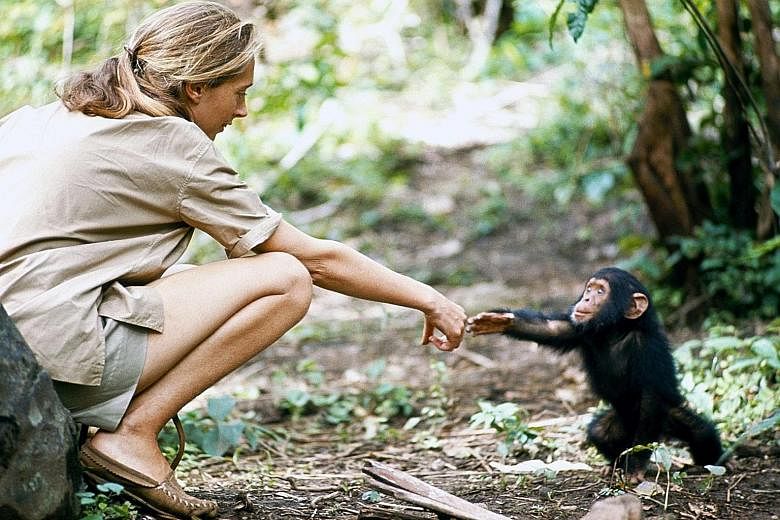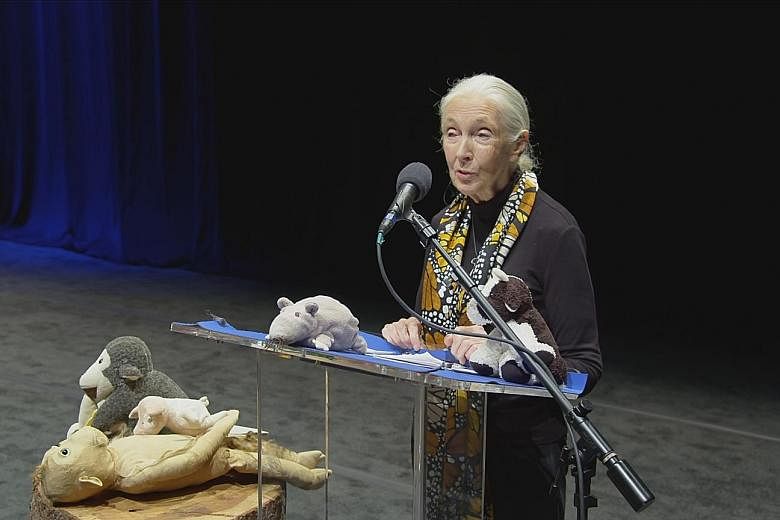Primatologist and conservation icon Jane Goodall believes the coronavirus pandemic was caused by humans' disrespect for animals and nature and that it may be a much-needed wake-up call.
The Covid-19 crisis comes up as the 86-year-old chats with the media from her home in England, where she and her family are in isolation .
Forced to take a break from what is usually a 300-day-a-year travel schedule for her conservation work, she has torn herself away from a mountain of administrative tasks to talk about a new documentary on her life, Jane Goodall: The Hope.
It premiered at 9pm yesterday on National Geographic (Singtel TV Channel 201 and StarHub TV 411) to mark Earth Day. There will be repeat telecasts on Saturday at 10.40am and on Wednesday at 4.10pm. The documentary uses seven decades of images and video to retrace Goodall's singular career - from the pioneering studies of chimpanzees she did in her 20s to her animal advocacy efforts in the decades since.
It is this life's work that convinces the English scientist that the pandemic is something "we brought on ourselves".
"We've had other epidemics. They've all started from viruses crossing the species barrier from animal to us and the reason is we're destroying habitats and also crowding them together.
"Some of them are coming into greater contact with people because they're moving out to try and find food. Then, we're hunting them, eating their meat and trafficking them. This pandemic started in the wet markets in China, possibly," she says.
She notes that the HIV epidemic began similarly, with people killing and eating chimpanzees in Africa. "We've also had epidemics coming from factory farms in the Western world, where animals are kept in cruel and confined conditions."
Human beings simply "haven't learnt from previous epidemics and we go on disrespecting the environment and animals", she says.
The consequences will continue to be dire, she warns. With scientists believing "we are in the middle of the sixth great extinction of life on the planet, if we carry on this materialistic, greedy worshipping of money and power, then there isn't much hope for us".
But Goodall thinks "the silver lining of this pandemic is that many people have woken up, many people have breathed clean air - perhaps for the first time in their lives".
She adds: "I've heard and seen it written again and again that it's a wake-up call. Perhaps it will help us realise we need to respect the natural world, think about future generations and not always put economic development ahead of protection of the environment.
"If we all get together right now and start making little changes in the way we think about things, we can turn it around. But this window of time is closing."
Still, this newfound awareness may evaporate once the crisis ends.
"We have many political leaders around the world who I fear will, as soon as this is over, want to get back to business as usual as quickly as possible. And the pollution and destruction of the natural world will come back."
Yet, Goodall is ultimately hopeful for the future of the human race - and it is mostly because of the enthusiastic young people she meets through the Roots And Shoots conservation outreach programmes run by the Jane Goodall Institute, a network of community organisations in 110 countries, including Singapore.
"It started in Tanzania with 12 high school students in 1991 and the main message is that every individual has a role to play and makes a difference every single day. We can make ethical choices in what we buy, eat and wear unless we're in extreme poverty."
She is asked about her beginnings as a fiery young animal lover - a woman who was too poor to attend university, but worked as a secretary to save for a trip to Africa, where she did the ground-breaking work on chimpanzees that would make her famous.
She says: "I would repeat what my mother said to me when I wanted to go to Africa and everybody laughed at me - because how would I get there? I was just a girl and Africa was far away. We didn't have money.
"She said, 'If it's something you really want to do, you're going to have to work hard and take advantage of every opportunity. But if you don't give up, you may find a way.'"
• Jane Goodall: The Hope premiered at 9pm yesterday on National Geographic (Singtel TV Channel 201 and StarHub TV 411). There will be repeat telecasts on Saturday at 10.40am and on Wednesday at 4.10pm.


